Why Great Thought Leaders Don’t Play the Publisher’s Game Peter talks with publishing expert Ken…
Leveraging Thought Leadership With Peter Winick – Episode 170 – Marshall Goldsmith
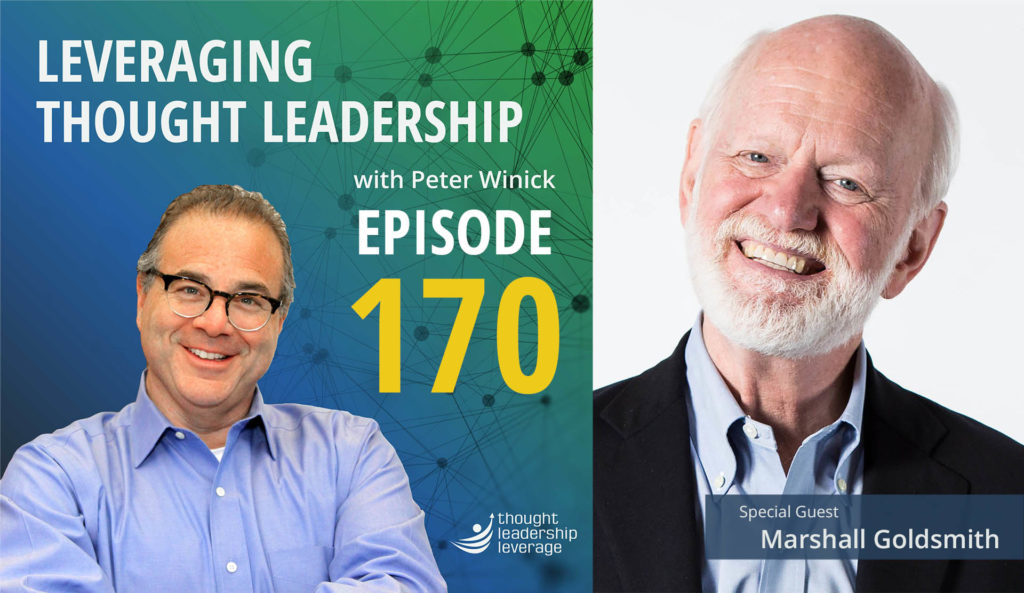
We are excited to celebrate our 170th episode with the #1 executive coach in the world – Marshall Goldsmith!
Marshall Goldsmith is a world-renowned business educator, coach, and best-selling author of such books as What Got You Here Won’t Get You There and How Women Rise. He’s also the leading expert in the field of successful leadership, and has helped over 150 CEOs and their management teams achieve positive, lasting change. There’s no one better in the business, and this week, Marshall is our guest on the Leveraging Thought Leadership Podcast.
Join us as Marshall shares stories about his work, and offers practical and proven advice for helping organizations reach their goals and surpass expectations. Marshall and Peter discuss the need to focus your expertise when building your brand; how to achieve truly successful partnerships; playing the long game of social media; and so much more!
170 episodes is a great accomplishment, and we’re grateful for your time. Thanks for listening!
When you’re done, remember to check out these additional tips from Peter for building your personal brand.
Transcript
Peter Winick And welcome, welcome, this is Peter Winick. I’m the founder and CEO of Thought Leadership Leverage, and you’re joining us on the podcast today, which is Leveraging Thought Leadership. I’m delighted today to have one of my favorites, actually, in terms of the content space, Dr. Marshall Goldsmith. He’s the only two-time winner of the Thinker’s 50 Award for the number one leadership thinker in the world. He’s been ranked as the number one executive coach in the word, and a top 10 business thinker for the past eight years. He’s the author or editor of 36 books, including three New York Times bestsellers that have sold over two and a half million copies. I can go on and on and about all his attributes, but I’d rather get in and just dive into the conversation. So thank you so much for joining us today, Marshall. So happy to talk with you. Great. So let’s just dive in here. You are someone that lots of people obviously admire and look up to. And we want to talk about the journey that you’ve taken on the business side here, right? So to paraphrase your book, so how did you get here?
Dr. Marshal Goldsmith Well, you know, I’m very, very fortunate. I, Paul Hersey, one of my old mentors, had a great quote. He said, easy to look tall and stand on the shoulders of giants. So I feel I have been very, very blessed. I’ll give you my story about this one more, as you requested, more of the business side. To start with, what I did is I met Paul Hersee many years ago. home, got a double hook. And he said, can you do what I do? And he, and I said, I don’t know. He said, look, I need this help. Can you do it? I do. I said I don’ know. I said look, I’m desperate. I said no, I dunno. He said I’ll pay a thousand dollars for a day. I was making $15,000 for a year. That was 42 years ago. I was 28 years old. A thousand dollars per day back then was a lot of money. Yeah. So I said well, I’ll give it a shot. I did a program for the Metropolitan Life Insurance Company. They were incredibly upset when I showed up, but I got ranked first place of all the speakers. And they called Paul up and said, do you want to send Marshall back again? We like him. Paul said, sounds good. He called me up, said, do you wanna do this again? That’s how I got into business. Very, very fortunate. I got in to coaching also by accident. A big company said to me, I got this kid working for me, young, smart, dedicated, hardworking jerk. He said, it’d be worth a fortune to me if I could turn the kid around. I said, I like fortunes, maybe I could help him. He said I doubt it. I said well maybe I can help him and he said I don’t think so. Then it came up with an idea. I said I’ll work with him for a year if he gets better pay me. If he doesn’t get better, it’s all free. That was the beginning of executive coaching.
Peter Winick I love it. So one of the things I observed in the way you’ve operated your business over the years is you’ve been really clear about what you love to do in terms of the speaking and the coaching and the writing, less of the coaching as of late, and really clear about what don’t want to be doing. And you’ve designed sort of the life and the business to support that where you know, you’ve got a variety of partnership deals, etc. So talk about sort of coming to the decision of, you know. Hey, I’m really good at this and therefore this is the way I should structure it. And I, you need others to help me and how do I vet them and all that sort of fun stuff.
Dr. Marshal Goldsmith Well, you know, it’s interesting because I’m really, if you had to look at my career, a lot of this is based on wonderful relationships. And one thing I’d recommend to all your listeners is be open-minded about doing volunteer work. Let me tell you about that. I did a program for the Red Cross, and I did free training for all their leaders and stuff, which was a huge project. And then through that, I got to meet Francis Hesselbein, who was a COB. Well, then Francis introduced me to Peter Drucker. And the first book I ever did was called A Leader of the Future, and the people on the cover’s name were Francis Hasselbein, Richard Beckhardt, Peter Drucker, and me. Now, I was nobody compared to these people.
Peter Winick Yep.
Dr. Marshal Goldsmith But after I did six books with them, guess what? I’m one of them.
Peter Winick Yeah, they’re pretty good.
Dr. Marshal Goldsmith Yeah, I’m one of them. And that wouldn’t have happened if I hadn’t done volunteer work. So I think it’s really good when you get started, just to meet great people, do volunteer work, or also pay your dues. I mean, nobody starts at the top. I mean when I was working with Paul Hersey, I was carrying the bags. Yep. I had a new mic last year and I was not him or Peter Drucker or Francis self-survival, or any of those. So, you know, I think if you pay your dues, it really, really helps a lot. So, and then back to what your question is about focus. I think it’s great to be an expert at something, but not everything. You really need to be sensitive. I’ve had an underworld expert at X, but I don’t do Y and Z.
Peter Winick Now, but early on, a lot of folks say, but I could do Y and Z and maybe I’ll do, you know, F and G and whatever as well. And I think it’s that discipline and that structure saying, no, I am the X person and I’m gonna be better at anybody than X and that’s my craft and that what I’m going to hone in on. And everything else is sort of a distraction. And I mean, it’s a tough discipline to maintain.
Dr. Marshal Goldsmith I completely agree with you because, you know, what happens is, number one, you can’t be the world’s expert at everything. You can be a dilettante at everything, but you can be the world expert at the everything. And when you focus, people have a lot more respect for you because you’re not the expert on everything. But my area of expertise is helping successful leaders achieve positive, lasting change in behavior for themselves or people in their teams. I’m the world’ expert on that. You know, do a Google search for helping successful leaders. The first 500 hits you get in the world, 450, or me, the entire rest of the world was 50. I won. And by the way, I’ve got a question. Who’s the most famous executive coach? Me. About you. I get a question, who’s second?
Peter Winick No idea
Dr. Marshal Goldsmith See, that’s really focus that’s function build a brand. And I would highly recommend to your listeners to build a brain, but your brand, if your brand is I’m good at everything, you have no brand.
Peter Winick Yeah, 100% because, you know, everybody’s a commodity or could easily be commoditized and it’s that investment in the brand and the consistency. So I want to talk for a moment or two, you’ve entered into lots of different relationships, partnerships, licensing deals, et cetera, et, cetera, give us some general thoughts about what you’re looking for in a partner in terms of either early on in the relationship and how you go about vetting the relationship, setting up success criteria, because you Thank you very much. Bye. The world of thought leadership is fairly small. You and I have crossed paths several times over the last 15 years and have the same, very similar colleagues and friends and people that we do business with and that we help. So what do you look for? What are the things, the indicators for you that this might be a good partnership or a good relationship?
Dr. Marshal Goldsmith Well, this is really a personal decision. I don’t like to manage things myself. Now I would be a very good manager, but I only have two flaws. When I have very limited ability, then two, I have less motivation. So that I have no motivation or ability to be a manager. I’ve decided to kind of avoid that. I don’ want to run a business because I can’t run a business, coach executives, write books and give talks at the same time. So I really don’t manage much of anything. I’m just, everything else I have is partnerships. My probably best partnership is the stakeholder centered leadership, or stakeholder centered coaching group. They do an amazing job of taking my material and teaching the people all around the world. I do not manage that organization though. They manage it. They’ve done a great job, they manage it, they’ve taught, they’ve certified 3,000 people. I’ve been really happy with the results. I’m pretty open-minded. Here’s the key. I just don’t want to do exclusive deals where I cut myself off from working with other people. Sure. I’ve done a lot of partnerships. Some mostly have been positive, some have bombed, but that doesn’t bother me that much. You know, I’m more open to try things out.
Peter Winick Yep, so if you think of everything as an experiment and manage your risk and your brand, because I would imagine doing the partnership that everything has risk and everything has potential upside, you don’t want to risk the brand. You don’t wanna risk the integrity of the content and the intellectual property. And you wanna make sure that you’re partnering with folks that have sort of the same standards that you do in terms of what excellence looks like, what great looks like et cetera. So how do you get some of those sort of vibes, if you will?
Dr. Marshal Goldsmith Well, you know, I am less concerned than you might imagine about that. Let me explain why. Okay. I’m an expert on content and the people I partner with are basically distribution networks. Well, if somebody screws up distribution, you know, people don’t blame me. I don’t do the distribution. I’m a content guy and I manage everybody else. So I haven’t really found that to be nearly as much as the problems people are concerned with. I’m really much more open-minded. I mean, I don’t know, I’m meeting today with a group called Pro Habits. Sounds like a fascinating organization.
Peter Winick Oh, I actually was just on a call in the process of doing a partnership with their CEO. They’re wonderful people.
Dr. Marshal Goldsmith seemed like a great organization, maybe a classic case study of someone that I would work with. You know, I’ve got a lot of positive partnerships. The other thing is, I don’t feel threatened by much of anybody. Sure. Like, I was just at David Allen’s conference where I was a keynote speaker. David Ulrich is my friend, Jim Kousas is my friends, you know.
Peter Winick Well, I want to talk about that friendship piece because in most businesses and in some cases it’s a mindset, these are my competitors and the rules of dealing with my competitors are we don’t share information and we’re not friends, et cetera. But what I found really beautiful and wonderful about the content space is, yeah, if you look through the lens of scarcity, we compete, but I think more importantly, the collaborations and the friendships that have evolved across, you know, various thought leaders. lead to just amazing things right whether it’s intrinsic and intellectual or business or financial but can you get in your better added than almost anyone i can think of.
Dr. Marshal Goldsmith Well, you know, my project of a hundred coaches, I went to a program called Design the Life You Love. The ones that are your heroes. My heroes were kind, generous people who were very thoughtful and they never charged me any money. Peter Drucker never charged any money, Warren Bennis never charged money, Francis Heselmeyer never charged my money, Richard Beckhardt, Paul Hersey, none of those people. So I just want to be like them. And I decided to give away all I know to 15 people for free, and the only thing That’s when they get old. They have to do the same thing. I made this selfie video, put it on LinkedIn. I think a hundred people may apply for this thing, right? Over 18,000 people applied for adoption. 18, 000. Yeah. I’ve adopted about 180 people. And if you saw these people, I don’t consider this. These are amazing people. Yep. We’re talking about the president of the world bank and the head of the Rockport foundation and head of Junior Achievement, The Nature Conservancy, CEOs, thinkers, just great people. And, you know, the whole thing was based on the concept of generosity. The only cost, there’s no, no money at all. And I give away everything I know to everybody. And the only crisis when they get old, they promise to do the same thing.
Peter Winick And I would imagine dozens if not hundreds of collaborations have come out of sort of the intersection of all those 180 brilliant people doing things on their own and learning from each other and developing relationships and friendships and projects and all sorts of cool stuff.
Dr. Marshal Goldsmith I think we’ve got two couples that are going to get married.
Peter Winick Really? Okay, so we’ve got maybe a matchmaking service as well.
Dr. Marshal Goldsmith It’s unbelievable. It’s been wonderful and I’ll tell you though, at one level you can say this is me giving back to others. Sure. Existentially, the biggest winner on this project is me. Yeah. I’m the one who won. People are so nice to me and kind and grateful and you know, what’s that worth?
Peter Winick Yeah, I mean, priceless, right, in the words of MasterCard. If you’re enjoying this episode of Leveraging Thought Leadership, please make sure to subscribe. If you’d like to help spread the word about our podcast, please leave us a review and share it with your friends. We’re available on Apple Podcast and on all major listening apps, as well as at thoughtleadershipleverage.com forward slash podcast. I want to talk a little bit about, let’s just talk about speaking as a business for a little bit. So it has changed drastically over the last 15 years in terms of the dominance of the bureaus to now speakers booking direct and conferences being shorter and give us an overview of what you’ve seen change and how you’ve managed to adjust to the changes to stay on top of your game from, you know, through the lens of the business side
Dr. Marshal Goldsmith I was just in St. Petersburg last week, I gave a talk in front of 50,000 people. Wow. And really one thing that changes when your fees get higher and higher is more and more of your work is overseas. And so a lot of my work is outside the U.S. now for speaking. Yeah, this next week I’m going to Spain, then I’m to Myanmar, I’m gonna to China. You know, I travel all around the world. In my life, I can just speak for me. I’m not really an expert on the speaking field as such. Have you ever seen a movie called This is Spinal Tap?
Peter Winick Yeah, oh, one of my favorites, yeah.
Dr. Marshal Goldsmith great movie well you know in the movie they get back together they can’t stand each other but they’re kind of desperate they make an album that kind of bombs they’re all depressed and someone says hey you’re number one in Japan they go to Japan and people are going crazy and they love them I feel like I’m this is my little tap I’m an agent speakers
Peter Winick I was going to say, you know, there was a period where, you know, the French thought Jerry Lewis was a genius. So, you know, you go where they think you’re best.
Dr. Marshal Goldsmith I am number one in Russia, China, India. I travel all around Myanmar, right? So yeah, I feel like I’m kind of the, this is final tap character.
Peter Winick I can see you doing a heavy metal band. But I think that’s interesting that there is a different value that is placed on North American speakers, which are to some degree a dime a dozen here, right? When you go overseas and start to develop that brand globally, because I would say it’s not just an organization calling you and say, hey, Marshall, could you come to Miramar this week? You have a global presence. Yeah. We don’t really need to tell people that. Yeah, but where I was going is, you know, you’ve got your books are out through the various distribution channels. People know of your work out there. So by the time they bring you in, there’s a high level of awareness of your content and who you are and what you’re about and all that sort of stuff. Exactly right. Okay. Let’s move for a moment because I’m sure you might have something to add on this as it relates to the brand. There’s a lot that one could do. There’s lot that should do. What’s… how have you… sort of manage the whole social media process because you’re you’re I think you’ve got a million followers or something on linkedin and
Dr. Marshal Goldsmith Yeah, on LinkedIn, I have 1.3-something million followers, you know, and I think it’s really, it’s very hard to get started. I was young enough to get it started earlier on LinkedIn. So I think I’m about number 80 in the world. It’s very, very hard get started, but I would recommend if you want to get in this field…
Peter Winick Yep.
Dr. Marshal Goldsmith you need to do it. And you realize it’s not easy and it’s time consuming. It’s time consuming. There’s nobody going to thank you in the short term. Nobody’s going to watch what you put out in the shorter term either. So you just got to go through the pain to get there. I mean, it’s very hard to get from zero to a thousand followers. I get a thousand followers every couple of weeks just randomly.
Peter Winick Right. Well, there’s a bit, obviously, there is a flywheel effect of some, you know, network of 1.3 million to have that just continue to organically grow. But I mean, your point is continue to put good stuff out there. And at first, you can’t be so metric obsessed, right?
Dr. Marshal Goldsmith That’s it. Because when you begin, there’s not, there aren’t going to be that many people listening.
Peter Winick Which is frustrating, right?
Dr. Marshal Goldsmith Well, it is frustrating and you just have to do it. I mean, I love, Peter, what you’re doing and I think it’s critically important for people to build a brand. And if you don’t, you’re gonna pay for it. So many people work hard, they have great careers. They’re really content experts, but they never build a band and they’re in essence talking to themselves. Yep. You know, I just recently, I had dinner with one of my friends and she met an actor. And he said, you know, well, I went to acting school with Robert De Niro and I was actually with him, but I didn’t want to play the game. Okay, fine. You didn’t play the games, but you’re an actor sitting in a bar showing up. Robert DeNiro’s not sitting in the bar saying he’s better than you.
Peter Winick Yeah, exactly, exactly. So, you know, when it comes to the brand, I think sometimes there’s, and I think there’s an irony here, people that are thought leaders that are keynote speakers, etc., many of them are actually introverts and don’t like attention shined on them in a certain way. And at some level, you know, the brand is you, and you have to have the courage and such to put yourself out there and to experiment. So, for example, you in three years ago, five years ago things were moving to short form video and short form in those days was defined as like three to five minutes. Now it’s 60 to 90 seconds. You have to really be willing to adjust and give the market what it wants, or you’re going to be antico…
Dr. Marshal Goldsmith I agree. Cool. Bob Dylan has a great quote, he who’s not busy being born is busy dying. Yeah, exactly, exactly.
Peter Winick So as we start to wrap up here, if there’s someone out there listening that’s, let’s say, equal to Marshall 20 years ago, 25 years ago right, successful, starting out on their journey, but not where they where they want to be just yet, what words of advice might you give them in terms of do this and maybe don’t do that in order to be more successful and have more impact, which is probably more important as a thought.
Dr. Marshal Goldsmith I would reach out to very successful people. I think you’re gonna find many of them to be kind and generous. Anybody that reaches out to me, I try to talk to them and help them as best I can. And the only price I have is they have to be willing to do the same thing. Let’s say they’re successful. They have to do same thing for other people when they get old. That’s wonderful advice.
Peter Winick Well, I can’t thank you enough, Marshall. I admired your work for many years and had the privilege of meeting you several times and getting to know you. And I can tell you all out there, he lives what he says. He’s one of the most generous and kind and thoughtful thought leaders out there. So thank you so much. I appreciate all that you’ve done.
Dr. Marshal Goldsmith Thank you for the great work you’re doing. I think it’s so important because You know a lot of people do have great content, but if they don’t get it out to the world It doesn’t really matter. So thank you for good work. You’re doing
Peter Winick Thank you so much. Enjoy your day. Thanks. To learn more about Thought Leadership Leverage, please visit our website at thoughtleadershipleverage.com. To reach me directly, feel free to email me at peter at thoughtleadorshipleverage.com and please subscribe to Leveraging Thought Leadership on iTunes or your favorite podcast app to get your weekly episode automatically
Comments (1)
Comments are closed.


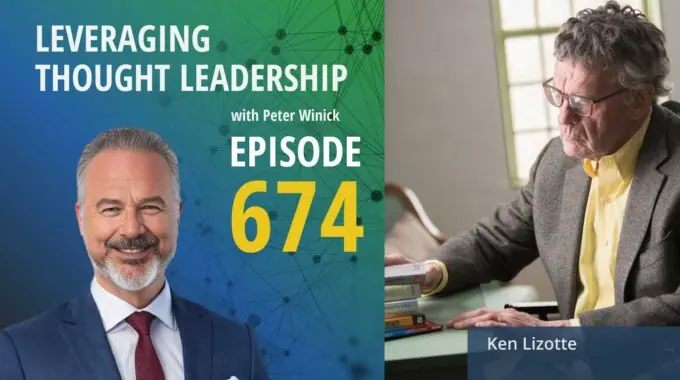
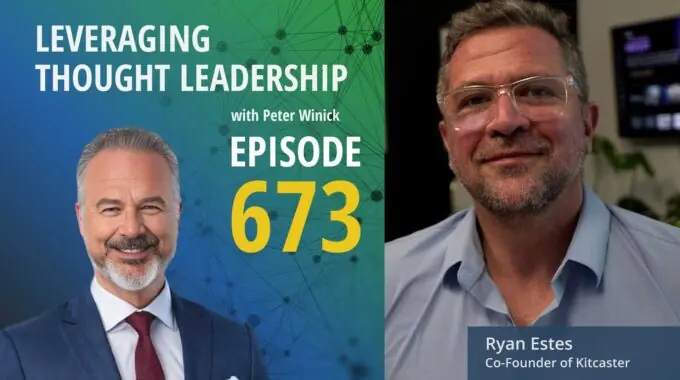
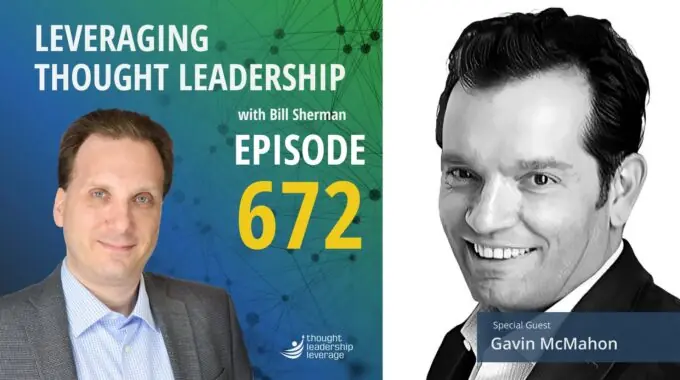
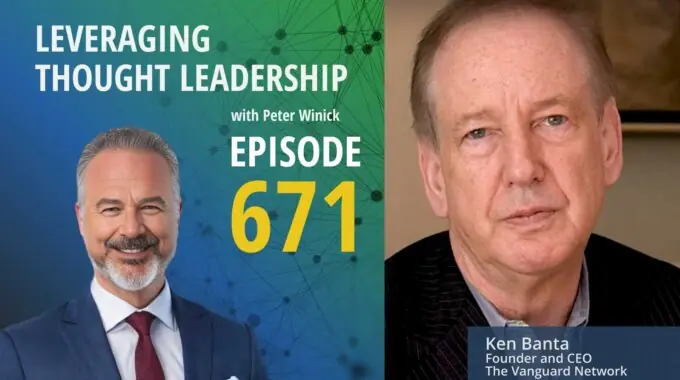
Thank you Peter and Marshall to bring such insightful discussion.